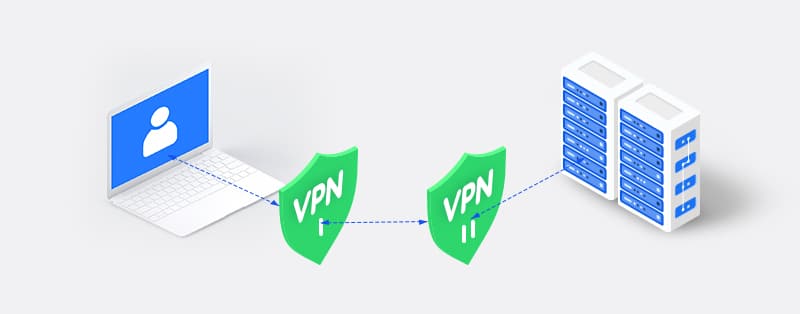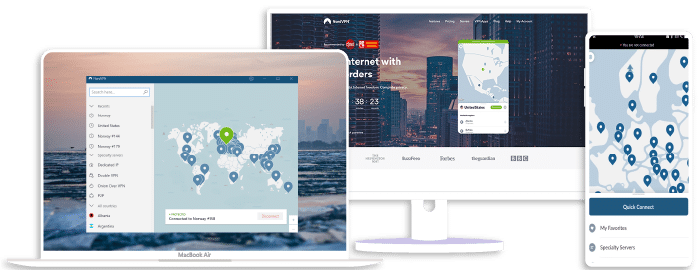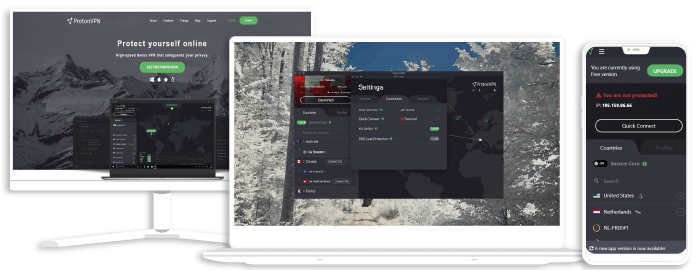What Is a Double VPN Connection & How Can You Set Up a VPN Chain?

Since VPNs (Virtual Private Networks) were first developed, a lot has been improved upon. The basic idea of a VPN is to change your IP address to make you anonymous, create a secure tunnel to route your data traffic and give you the ability to unblock content or get past censorship.
However, VPN providers keep updating their new technologies or creating new ones to replace outdated versions. You can now find VPNs with kill switches, split tunneling features, and more. It is through this non-stop development that the “Double VPN” feature was created.
Double VPN is essentially a feature that allows you to transmit your traffic through two VPN servers rather than the usual one server. By doing so, you get extra encryption added to your data, which means more security.
In this article, you’ll get an in-depth look at the Double VPN connection. So, if you have been wondering what it is all about or whether a Double VPN connection is what you need, keep reading to get your answers.
What Is a Double VPN Connection?
Going by its name, Double VPN is an advanced feature that makes it possible to use two VPN servers for routing your traffic. This feature is also known as multi-hop. Double VPN creates a VPN server chain that provides double the encryption you get from a single VPN connection and stronger security. However, in some instances, a Double VPN connection could mean when you use two VPNs at once.
A Double VPN connection also conceals your Internet Service Provider (ISP) IP address twice as it routes your traffic. This is very important if you’re trying to hide your identity from the government or malicious characters. So, with a Double VPN, you don’t have to worry about changing your IP address with each connection.
However, as effective as Double VPN is, it is not a common feature with VPN providers. This may be because the feature causes slower connections. By routing your traffic through two secure servers in different locations far apart and using a double encryption process, you can’t experience the same speeds you get from a regular connection.
Some trusted VPN providers that offer the Double VPN feature include:
NordVPN
Overall score: 9.6
- 8,700+ servers available in 129 countries
- Connect up to 10 devices simultaneously
- Great security features
- Verified no-logs policy
- Unblocks streaming platforms
30-day money-back guarantee
NordVPN offers one of the best Double VPN services available. The provider has a broad secure server network and also maintains a no-log policy. NordVPN also provides top-notch encryption protocols and high-speed connections. It is very easy to set up NordVPN’s Double VPN feature. NordVPN is a paid service, and you could subscribe with $3.71 per month for a 2-year plan.
Best offer: $3.96/month (Save 70%)
30-day money-back guarantee
Proton VPN
Overall score: 9.4
- 17,250+ servers in 125 countries
- Free version available
- Strong security features
- Reliable no-logs policy
- Allows Perfect Forward Secrecy
30-Day Money-Back Guarantee
ProtonVPN is one company that takes privacy and security very seriously. It is perfect for streaming and other high-speed activities. This VPN is equipped with a Secure Core feature and a kill switch. ProtonVPN has several subscription plans, with the basic plan priced just under $5. The VPN has a simple interface, so you shouldn’t face any difficulty running Double VPN connections.
Best offer: $2.49/month (Save 64%)
30-Day Money-Back Guarantee
How Does a Double VPN Connection Work?
The basic function of a Double VPN is to cloak your IP addresses and encrypt your data twice. Your IP is switched once with a regular VPN connection, and you get just a single layer of encryption.
If your VPN provider uses AES-256 encryption, a Double VPN connection simply adds additional encryption rather than doubling it to AES-512 encryption. Your data traffic just gets encrypted as it passes through each VPN server. You can break down the process into four simple steps:
- A VPN app sends encrypted traffic from your device to a secure server.
- The first server goes ahead to encrypt it again before redirecting it to the second server.
- On arriving at the second VPN server, your traffic gets decrypted.
- Your traffic is finally sent to its intended destination with your security and privacy intact.
The extra layer of encryption makes it difficult for your traffic to get compromised. Also, the VPN switches between UDP and TCP protocols as it transmits your data, which enhances the security the VPN provides.
While some VPN providers claim to offer Double VPN features, many do not actually. In reality, their servers decrypt your data twice, which leaves you vulnerable to threats if any of the servers get hacked.
What Is A VPN Chain?
A VPN chain, or VPN chaining, describes having more than two VPN connections simultaneously. It is also referred to as VPN cascading or a multihop VPN. This just means that it is possible to redirect your traffic through three or more servers simultaneously.
Like a Double VPN connection, a VPN chain also offers an extra layer of encryption with each server, and it also adds more IP addresses for more privacy. To set up a VPN chain, you will have to go through a long process (which we will talk about soon), but in the end, it offers more security and privacy than a Double VPN connection.
How to Set Up a VPN Chain
There are several ways you could set up a Double VPN or a chain VPN. It all depends on your abilities and the tools at your disposal. However, here are some of the best and easiest options:
Self-Configurable Multihop VPN Connection
This refers to VPN cascades that you could configure within a VPN app. The VPN provider allows you to choose the servers you want to include in the VPN cascade. Depending on the VPN provider, you get as many as four VPN server hops.
Doublehop VPNs
A doublehop VPN offers you only two VPN server hops, as the name implies. It is more common with VPN providers than with self-configurable multihop VPN connections. When you use a doublehop VPN, your connection gets linked with another server when you connect to a specific VPN server.
VPN providers that offer double VPN connections provide server pairs like Canada-US or UK-Scotland. This means that when you connect to the first server, your traffic is then redirected through the second server before it reaches the internet.
Router + VPN Client Connection
A fairly simple method to set up a double VPN connection is to first configure a VPN service on your router and then set up the VPN client on any of your devices. By doing this, you create a double VPN connection because your data is first sent across your router’s VPN server before it is rerouted through the second VPN server connected through the VPN client.
Advantages of Double VPN Connections
Overall, Double VPN provides enhanced privacy and security, and it does so through different means such as:
Double Encryption
The process of directing your traffic through two VPN servers puts it through encryption twice. With many secure VPNs using military-grade encryption these days, it is already impossible to crack a single layer of such encryption, let alone a double layer.
IP Cloaking
When you use a VPN, your ISP IP address gets replaced with another from the VPN server. However, with a Double VPN or VPN chain connection, the second server hides your new IP address, and every other server on the chain does the same. So, none of the servers can tell which is your real IP address, and even if one server gets compromised, your identity remains safe.
Multiple Protocols
With a Double VPN connection, you can alternate between TCP and UDP tunneling protocols. This offers better security standards.
Hidden Location
Double VPN connections put your traffic in either of the countries the servers are located. Anyone trying to monitor your connection would find you in multiple locations far from each other with a multihop connection. This is important if you’re a political or social activist in countries where online rights are suppressed.
Disadvantages of Double VPN Connections
Double VPN isn’t a first-choice option for many VPN providers because of its drawbacks. Although it is a great tool, it is not perfect, and many people believe you can do without it. However, if you’re interested in using it, here are some disadvantages to consider:
Slow Speeds
This is arguably one of the most serious disadvantages with Double VPN or VPN chain connections. When you use a regular VPN connection, the encryption and security protocols reduce your connection speed. So with more VPN servers in the mix, it translates to even slower speeds. So if the goal is to stream videos or use torrents faster, a Double VPN connection isn’t a good idea.
Server Selection
With Double VPN connections, you are limited to certain location pairs usually preset by the VPN provider. However, a regular VPN could offer you more than a thousand VPN servers in several countries to choose from. Nonetheless, you’ll probably still get popular locations. The only thing is that the servers in these locations would get congested easily because of multiple users.
Conclusion
Overall, Double VPN connections are effective at protecting your privacy and adding extra security. However, you should be aware of certain drawbacks, such as slow internet speeds and fewer VPN servers. Regardless of its flaws, a Double VPN is essential if your internet rights are infringed upon or if anonymity is very important to you. Sadly, not many VPN providers offer Double VPN at the moment.
Join the TechRobot Newsletter
Actionable tips on online security, the best VPNs, unblocking guides, and special offers — straight to your inbox.



